



Indian Immunologicals Limited (IIL) is a name that few might have heard of outside the vaccine industry. But the vaccine maker is expected to play a crucial role in Bharat Biotech's ambitious plan to ramp up Covaxin production to 700 million doses annually.
Executives of IIL are on overdrive to repurpose the newly built manufacturing facility at Karakapatla on the outskirts of Hyderabad to produce the drug substance of Covaxin.
This facility was meant to produce the Rabies vaccine and other human biologicals. IIL is the largest producer of the Rabies vaccine in the country.
In an exclusive interaction with Moneycontrol, K Anand Kumar, Managing Director of IIL, told that the technology transfer process is well underway, and the company has the capabilities and expertise to manufacture inactivated viral vaccines at commercial scale and under biosafety containment.
Kumar said by July-August, IIL would be rolling out the Covaxin drug substance from its factory. Bharat Biotech will do the fill and finish at its factory.
Kumar didn't specify the quantity of drug substance that will be made by IIL, but said it will be enough to make a "few million" doses every month.
Kumar says the virus has been handed over to them.
"We need to understand the process, do some preliminary trials at a smaller level to ensure that it goes well when it is scaled up, plan raw materials, this is going as we speak," Kumar said.
"We will be the fastest to give the drug substance to Bharat Biotech," Kumar added.
Bharat Biotech is yet to respond to questions shared by Moneycontrol on the possible vaccine capacities that will be added through IIL and the nitty-gritty of the partnership.
To be sure it isn't IIL alone, Bharat Biotech is also working with Maharashtra state-owned Haffkine Bio-Pharmaceutical Corporation (Haffkine Institute) and public sector undertaking Bharat Immunologicals and Biologicals based in Bulandshahar, Uttar Pradesh. Both Haffkine Institute and Bharat Immunologicals and Biologicals manufacture oral polio vaccines.
What sets apart IIL from Haffkine and Bharat Immunologicals and Biologicals is that it doesn't have to build a new containment facility. The manufacture of Covaxin drug substance will need BSL-3 containment facility as it deals with handling live SARS-CoV-2 virus, with high risk of virus escaping.
Building a BSL-3 containment facility would take about six months. Haffkine indicated that the first batch of Covaxin will only be manufactured by early 2022.
"Bharat Biotech facility is just 7-8 km away from IIL, it is convenient logistically for people from Bharat Biotech to come and help us in tech transfer and train our staff quickly," Kumar said.
Competitors joining hands
Kumar says IIL and Bharat Biotech are fierce competitors in the market, especially for the Foot and Mouth Disease vaccine (FMD) and Rabies vaccine. IIL guards its market leadership of FMD and Rabies vaccine very closely, but Bharat Biotech is emerging as a challenger.
In fact, IIL was set up by the National Dairy Development Board in 1982 to indigenously develop and produce vaccines for highly infectious and fatal Foot and Mouth Disease (FMD) that affects cattle. IIL is the world’s top producer of FMD vaccine and supplies around 80 percent of it for the control programme in India.
But IIL enjoys a fair degree of autonomy to run its affairs. Unlike other public sector vaccine makers, IIL is a profit-making company. The company in FY20 reported revenues of Rs 906 crore and a net profit of Rs 254 crore.
The company hires professionals from outside like Kumar who himself is a biotech veteran who worked in companies like Wockhardt, Pfizer and MSD (US Merck).
"We (IIL and Bharat Biotech) are fiercely competing companies, we kept aside all our marketing-related differences in the interest of the nation, and have come together," Kumar said.
IIL has partnered with the Griffith University of Australia to develop a live attenuated vaccine against novel coronavirus disease (SARS – CoV-2). The live attenuated vaccine contains a live but weakened virus.
The company said the development of this vaccine is progressing.
Discover the latest Business News, Sensex, and Nifty updates. Obtain Personal Finance insights, tax queries, and expert opinions on Moneycontrol or download the Moneycontrol App to stay updated!